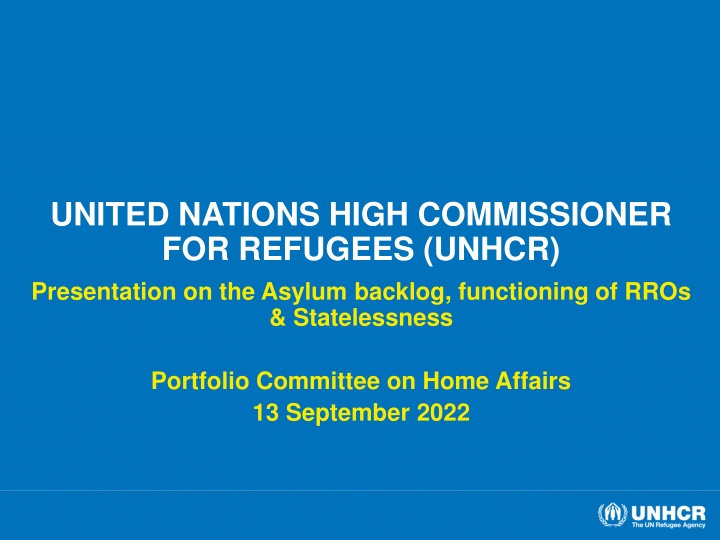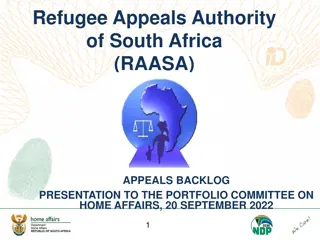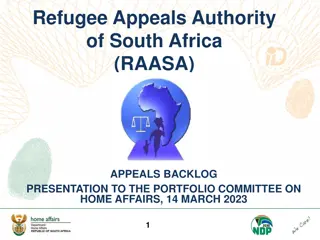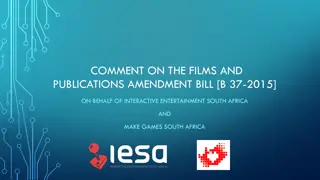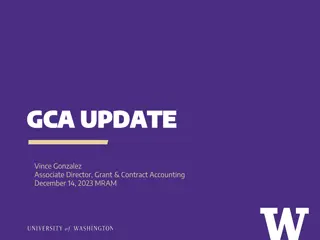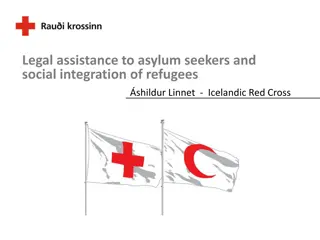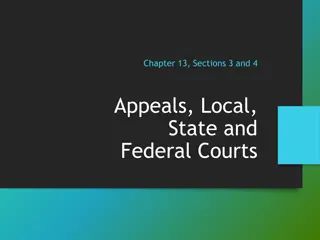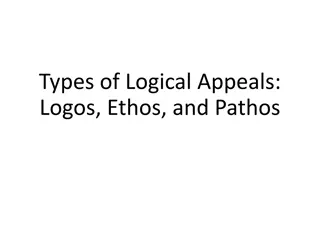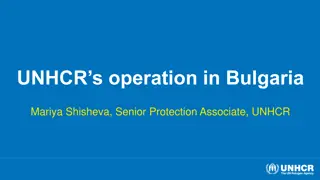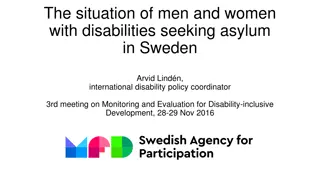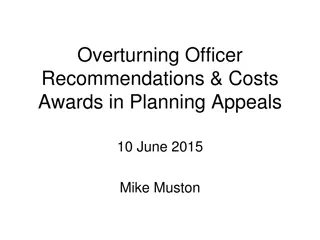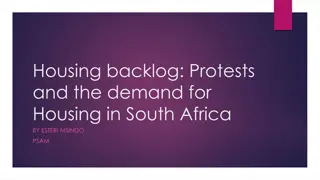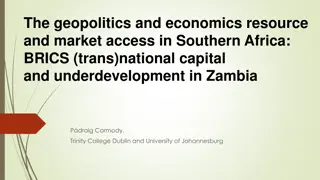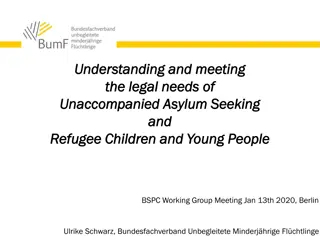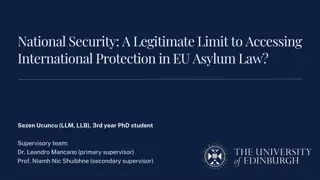Update on UNHCR's Asylum Appeals Backlog Project in South Africa
The presentation by the UNHCR highlighted the background, successes, and challenges of the Asylum Appeals Backlog Project in South Africa. The project aims to eliminate the existing backlog of 153,000 appeals and prevent new backlogs, with a focus on digitization, research, and efficient decision-making. Successes include the appointment of new officers and engagement with stakeholders, while challenges revolve around incomplete files and poor interpretation. The way forward involves full implementation of the project plan and expanding engagement to improve asylum procedures.
Download Presentation

Please find below an Image/Link to download the presentation.
The content on the website is provided AS IS for your information and personal use only. It may not be sold, licensed, or shared on other websites without obtaining consent from the author.If you encounter any issues during the download, it is possible that the publisher has removed the file from their server.
You are allowed to download the files provided on this website for personal or commercial use, subject to the condition that they are used lawfully. All files are the property of their respective owners.
The content on the website is provided AS IS for your information and personal use only. It may not be sold, licensed, or shared on other websites without obtaining consent from the author.
E N D
Presentation Transcript
UNITED NATIONS HIGH COMMISSIONER FOR REFUGEES (UNHCR) Presentation on the Asylum backlog, functioning of RROs & Statelessness Portfolio Committee on Home Affairs 13 September 2022
Content of the session Asylum appeals Backlog Project Re-opening of the Refugee Reception Offices (RROs) Statelessness
Asylum Appeals Backlog Project: background As reflected in the Global Compact on Refugees, UNHCR is greatly invested in supporting governments around the world to create asylum systems that are fair, efficient, adaptable and which have integrity. In the Republic of South Africa, the government requested support to address the large backlog of asylum appeals. In 2019, UNHCR funded an independent expert to assess the situation and put forward a proposed plan. The Minister accepted this plan and in March 2020, a four-year project partnership (2021-2024) was agreed and signed with two goals: 1) to eliminate the existing backlog of 153,000 appeals and 2) to introduce mechanisms to prevent new backlogs from forming. The agreed project plan emphasizes the importance of file digitization to efficient decision-making. It also introduces the roles of key support staff who conduct research on countries of origin, prepare files and stream the cases depending on their complexity. These features are intended to ensure the appeal decision-makers can adjudicate cases quickly but fairly. The agreed plan also put forward proposal that some individuals (about 55,000) in the backlog (those who applied before Dec 2011) receive consideration for grant of immigration leave based on agreed criteria not related to refugee status but rather their long presence in South Africa ( Heritage Files ) UNHCR is an active member of the appeals backlog project s tripartite Advisory Group (DHA, Refugee Appeals Authority, UNHCR) and offers both financial (salaries of appeal adjudicators, IT equipment) and technical support to the project (expertise on efficient high quality asylum adjudication)
Asylum Appeal Backlog Project: success and challenges Successes Ongoing challenges Number of appeals decided to date remains low (450 decisions have been made, 284 incomplete files returned back to DHA) Great majority of new appeals officers ( members ) are in post and based around the country A new Chairperson, Zilpha Raphesu, was appointed and is taking charge of the project Quality of interpretation is poor Engagement with UNHCR is open, positive and collaborative Many files are incomplete and must be sent back Full complement of appeal members and vital support staff (e.g. Project Manager, Refugee Appeals Officers) Creation of a Heritage File committee South Africa pledged its commitment to addressing the backlog at the Global Refugee Forum, making it eligible to access further support via the Asylum Capacity Support Group mechanism. Heritage files are still being verified to ensure the continued presence of these individuals in South Africa before criteria is agreed and applied. Once this is done, this will have a great impact on lowering the backlog. WAY FORWARD: Ensure all features of the original plan are implemented as agreed including scanners to digitise files, full cohort of appeal members, full cohort of key support staff (including Project Manager), implementation as per new adjudication methodology As agreed at January 2022 High Level Dialogue between UNHCR and DHA, expand engagement to quality of first instance asylum procedures - i.e. front load quality
Re-opening of the RROs UNHCR commended the Department of Home Affairs (DHA) for reopening the Refugee Reception Offices (RROs) following the end of the National State of Disaster, and acknowledged the Department s efforts to streamline services by moving some applications online. UNHCR is encouraged to hear from DHA that Cape Town RRO closed since 2012 may soon reopen and serve the refugees and asylum-seekers of Western Cape and surrounding provinces once again. UNHCR observed that in some RROs new asylum applicants are not issued with a Section 22 asylum seeker visa after registering their asylum claim. Instead, the permit is only issued once they lodge a notice of appeal against a first instance rejection. This can leave asylum seekers undocumented and at risk. UNHCR has raised concerns with DHA of reports of very high first instance rejections of new asylum applications, adding to the existing backlog. Lastly, UNHCR observes that refugees and asylum-seekers with pre-March 2020 expired visas are being referred to the National Prosecuting Authority (NPA) for criminal proceedings and fines in violation of section 37b of the amended Refugees Act ( Offences and Penalties ). Here, UNHCR recommends that DHA considers an amnesty period during which these asylum-seekers and refugees can apply for renewal of their documentation without referral to the NPA. UNHCR looks forward to looking into these and other matters in collaboration with the DHA
Statelessness The Republic of South Africa made a number of statelessness-related pledges in 2011, including with respect to the accession to the UN statelessness conventions. Although this pledge has not yet been implemented, South Africa remains committed to its implementation. Notwithstanding the issue of accession to the statelessness conventions, and the pending push towards a civil registration framework, in the interim, the Republic of South Africa has taken some positive steps that are enabling or facilitative towards resolving statelessness issues: It has enacted progressive nationality legislation that grants nationality to children born and registered in its territory who would otherwise be stateless; Participated in the drafting of the draft Ministerial Declaration and Regional Action Plan to End Statelessness in the Southern African Development Community (SADC); Appointed a government focal point on statelessness; Participated in the drafting of the AU protocol on the Right to Nationality and the Eradication of Statelessness in Africa; Co-hosted a statelessness national dialogue with UNHCR, that culminated in a National Action Plan to End and Prevent Statelessness, currently awaiting endorsement by DHA and stakeholders
Please visit www.unhcr.org for more information
